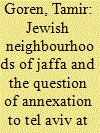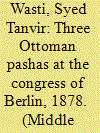|
|
|
Sort Order |
|
|
|
Items / Page
|
|
|
|
|
|
|
| Srl | Item |
| 1 |
ID:
148628


|
|
|
|
|
| Summary/Abstract |
Al-Wefaq's complex nature led to ambiguity over the relationship between religion and politics and over the balance between Islamic ecumenism and sectarianism. While the Shici uprising presented a national and democratic agenda, questions remain over the party's full commitment to democracy and its loyalty to the national framework in the current regional turmoil with the empowerment of Shicis and disintegration of nation-states. There could be a discrepancy between the declared aims of an oppositional movement and its actions once it assumes power. The problematic legacy of minority–majority relations in Bahrain, the country's political culture and the difficult example of post-2003 Iraq, are further barriers to advancing full democracy. If the Shici majority gains power the party may become less democratic and more sectarian. Yet, it will also have much to lose given Bahrain's strategic alliance with the US and its position as a financial services hub in the region.
|
|
|
|
|
|
|
|
|
|
|
|
|
|
|
|
| 2 |
ID:
148630


|
|
|
|
|
| Summary/Abstract |
By discussing the role of the Balkan Entente within Turkish–Yugoslav relations, this article endeavours to reflect the extent to which the Entente guaranteed security to Turkey and Yugoslavia. It deals with the 1934–41 period, which starts with the formation of the Balkan Entente and ends with the German invasion of Yugoslavia. The article is written mainly based on Yugoslav archival documents and aims to provide an alternative narrative that contests the conventional Turkish view. It also demonstrates that although the political leaders in Turkey and Yugoslavia became more optimistic about the future of the region after having signed the Balkan Entente, their perception of threat changed over time during the period of increasing instability in Europe.
|
|
|
|
|
|
|
|
|
|
|
|
|
|
|
|
| 3 |
ID:
148627


|
|
|
|
|
| Summary/Abstract |
Modern understanding of the institution of slavery and the experience of slave themselves has been largely defined and dominated by a template drawn from the modern plantation slavery of the Americas. Images of slave agency and of abolitionism have been derived from the same template in which slave agency is equated with unambiguous resistance to slavery as such, and abolitionism attributed to a moral response originating within the slave-owning society and possessing a strong redemptive dimension. The weakness of an elite abolitionism regarding ‘Islamic’ slavery in the states of the eastern Mediterranean has often been noted and contrasted with the moral force and redemptive power of Western abolitionism. This article argues first that the ascription of a uniquely Islamic character to Middle Eastern and North African slavery, which in fact shares its key characteristics with practices and notions common to medieval and early modern southern Europe, is a survival of nineteenth century Orientalism. It argues second that the relative weakness of an abolitionist sentiment can best be explained not by the power of an Islamic discourse but by the structures of slavery in the region and especially the forms of agency to which those structures gave rise.
|
|
|
|
|
|
|
|
|
|
|
|
|
|
|
|
| 4 |
ID:
148629


|
|
|
|
|
| Summary/Abstract |
Initial findings from five recently transcribed censuses of the Jewish community in nineteenth century Palestine, commissioned by Sir Moses Montefiore. This article discusses each census and presents uncorrected population figures. It describes how the Jewish community was rapidly changing: the population increased almost fourfold between 1839 and 1875, primarily due to immigration from Ashkenazi countries. The Jewish community was majority Ashkenazi by 1875. Analysis of the census data gives us detailed information about the community, such as the fact that Ashkenazim were significantly more likely than Sephardim to be engaged in full-time Torah study, whereas individuals who had immigrated to the land of Israel were slightly less likely. It also suggests that immigrations occurred at all ages, although the average age of an immigrant when they came to Palestine was 36.
|
|
|
|
|
|
|
|
|
|
|
|
|
|
|
|
| 5 |
ID:
148625


|
|
|
|
|
| Summary/Abstract |
One of the most complex issues facing British rule on the local municipal level towards the end of the Mandate period was the problem of Jaffa's Jewish neighbourhoods. This question, which emerged with the outbreak of the 1936 disturbances, engaged the government thereafter until the end of the Mandate. The demand by the residents of Jaffa's Jewish neighbourhoods for annexation to Tel Aviv – actually for municipal detachment from Jaffa – constituted the root of the problem. In this setting of the sharpening of relations between the authorities and the Jews and Arabs in 1945–1947, all three involved parties found themselves deeply immersed in it in the attempt to bring about its resolution. The annexation problem ceaselessly preoccupied the institutions of the Jewish Yishuv as a Zionist–Yishuv struggle of the highest order. This period gave rise to a series of unprecedented moves by the Jewish side, which were intended to influence the British government toward solving the problem. The article examines its development of the problem from the viewpoint of the three sides concerned in the years 1945–1947, with the focus on the policy line adopted by the Jewish side, its implications and its results.
|
|
|
|
|
|
|
|
|
|
|
|
|
|
|
|
| 6 |
ID:
148626


|
|
|
|
|
| Summary/Abstract |
In the weakened Ottoman Empire of the nineteenth century, revolts in the Balkans and subsequent Russian intervention led to the Russo-Turkish War of 1877 which resulted in a great loss of Ottoman territory and population in the European part of the Empire. After the ceasefire at Edirne in January 1878 and the signing of the Treaty of San Stefano in March 1878, the Congress of Berlin was convened in June 1878 in order to achieve a political settlement. High-level plenipotentiaries of the main European Powers took part in the deliberations. Against the backdrop of the Congress of Berlin, details are provided about the lives and careers of the members of the Ottoman Turkish delegation.
|
|
|
|
|
|
|
|
|
|
|
|
|
|
|
|
| 7 |
ID:
148624


|
|
|
|
|
| Summary/Abstract |
The article examines the construction of the 1973 war as a legitimating discourse in Egypt. After an analysis of formal texts (for example, school textbooks), semi-formal texts (for example, the Ahram newspaper) and informal texts (for example, songs scripted to commemorate the event), the article finds a pattern which constructed the war as a ‘massive, consistent and unquestionable’ victory for Egypt under the rule of Anwar Sadat (1971–81). Based on critical discourse analysis of these previously untapped texts over the eight years of Sadat's rule after the war and drawn on primary sources and interviews, the article traces the genealogy and operationalization of discourse through exploring linguistic and extra-linguistic features synchronized towards the efficacy, durability and credibility of this process. The essay finds that the discourse retains an appearance of coherence, since it is always so closely attuned to its broader state-controlled political context. Rather than inferring from this coherence that the discourse is as historically ‘truthful’ as any other, this study provides hard evidence that it relies instead upon intentional falsehoods.
|
|
|
|
|
|
|
|
|
|
|
|
|
|
|
|
| 8 |
ID:
148623


|
|
|
|
|
| Summary/Abstract |
The history of Israel's turbulent relations with the Eastern bloc nations during the Cold War has one exception, Romania. Unlike other Warsaw Pact members, Romania did not sever relations with Israel following the 1967 war. Central to these relations was Romanian Communist leader Nicolai Ceausescu, who managed to establish himself as an important figure among both Arabs and Israelis. This article will examine Romanian–Israeli relations during the 1970s and especially Ceausescu's role in the Egyptian–Israeli peace negotiations. Recent Israeli and some Romanian documents released from the Israeli State Archive and the Begin Centre reveal much about Israel's attitude towards Romania and Ceausescu's involvement in the Middle East, and serve to shed light on a heretofore neglected aspect of Israeli foreign policy. Some of the main issues to be addressed are Ceausescu's influence on Egyptian and Israeli decision makers, Israel's prime motives in maintaining a close relationship with Romania, the importance of Romanian Jewry's position to Israel's policy vis-à-vis Romania and the extent to which these relations represented a back channel that facilitated some contact with the Kremlin. All these will be examined against the larger backdrop of the Cold War and the Arab–Israeli conflict.
|
|
|
|
|
|
|
|
|
|
|
|
|
|
|
|
|
|
|
|
|